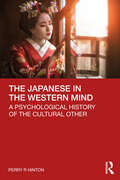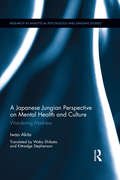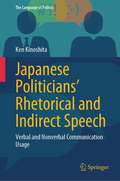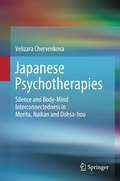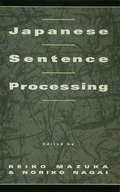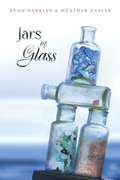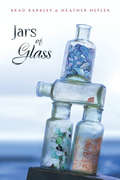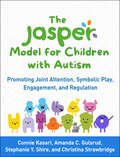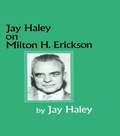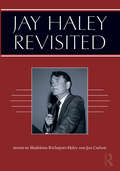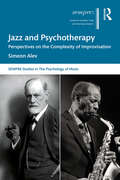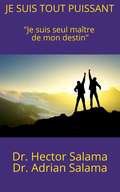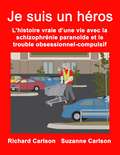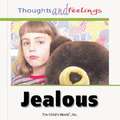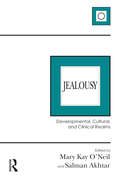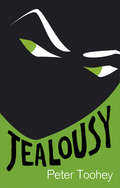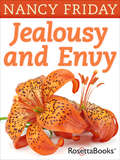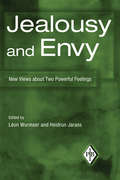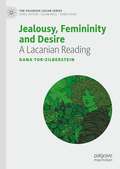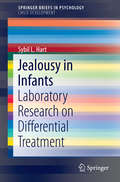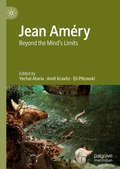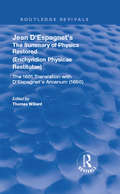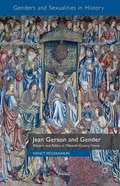- Table View
- List View
The Japanese in the Western Mind: A Psychological History of the Cultural Other
by Perry R HintonThis fascinating book is an insightful exploration of Western perceptions and representations of Japanese culture and society, drawing on social and cultural psychological ideas around stereotypes and intercultural relations. Hinton considers how the West views the Japanese as an ideologically different “other”, and proposes a cultural theory of stereotypes from which to explore Western observations of the Japanese. The book explores Western socio-cultural representations of the Japanese alongside Edward Said’s well-known theory of Orientalism. It examines the West’s intercultural relationship with Japan, and how this has changed over time, to show how the Japanese have been represented in the Western mind throughout history, to the present day. Hinton argues that our view of other cultures is based on our own cultural expectations, which involve complex issues of meaning-making and perceived cultural differences. This book foregrounds the research through accounts of Westerners about the Japanese, to reveal how cultural representations can influence the ways in which people from different cultures communicate in interaction, and how intercultural understanding or misunderstanding can arise. By reflecting on the changing Western representations of the Japanese, and how and why these have emerged, this book will be of interest to students, academics and general readers interested in stereotypes, cultural psychology, intercultural communication, anthropology and Japanese culture and history.
A Japanese Jungian Perspective on Mental Health and Culture: Wandering madness (Research in Analytical Psychology and Jungian Studies)
by Iwao AkitaA Japanese Jungian Perspective on Mental Health and Culture: Wandering Madness explores differences between Western and Japanese models of mental health. It argues that while the advent of modern mental health has brought about seminal changes in our understanding of and relationship to those who face its challenges, the cure also seems to be something of the cause, as the classification of mental disorders continues to expand and increasing numbers of people show up to fill them. In this book, psychiatrist and Jungian analyst Iwao Akita presents a new theory of psycheology in order to highlight what has been lost in our rush to medicalize the psyche, as well as offer a remedy for restoring balance. Drawing upon examples from both Japanese and Western cultures, Dr. Akita discusses an alternative perspective to the polarized viewpoint towards which the West tends. He distinguishes the concept of madness from psychopathology and outlines its dynamics through numerous clinical and cultural examples. He describes the underlying dynamics of substance use and personality disorders, makes important links between these conditions, and clarifies how they can develop into madness. With references to familiar stories and myths from Western and Japanese cultures, this book makes an important contribution to our understanding of mental illness and health, while also making us more aware of how these issues are common to the human experience. This book will be of key interest to academics, researchers, and postgraduate students in the fields of psychoanalysis, Jungian and Post-Jungian studies, and mental health studies. It will also appeal to psychiatrists and other mental health professionals, as well as those with a particular interest in substance use, personality disorders, madness, and cross-cultural comparisons of mental health models.
Japanese Politicians’ Rhetorical and Indirect Speech: Verbal and Nonverbal Communication Usage (The Language of Politics)
by Ken KinoshitaThis book presents a new approach to the analysis of political psychology, political culture, and communication. Using data from Japanese political interviews and parliamentary deliberations, it reveals how Japanese politicians address their audience. In addition to analyzing the use of verbal political rhetoric, the book shows that nonverbal communication is highly relevant as well. In a context where political leaders are becoming increasingly important, identifying the techniques used by Japanese politicians – especially facial expressions, hand gestures, and other forms of body language – to gain support from the audience, leads us to consider communication practices of political leaders around the world. Politicians adopt different communication styles based on their specific electoral system. The more single-seat constituency political candidates use rhetoric, the greater their chance of appealing to voters. In addition, the use of personal experiences and others' speech quotations function as effective political rhetoric, further attracting the audience’s attention. In short, this book presents a more comprehensive and holistic picture of political “rhetoric” than usually offered by other studies of political communication.
Japanese Psychotherapies: Silence And Body-mind Interconnectedness In Morita, Naikan And Dohsa-hou
by Velizara ChervenkovaThis book discusses both the theoretical and practical aspects of three Japanese psychotherapeutic approaches - Morita, Naikan, and Dohsa-hou. Specifically, it tracks how the strong cultural specificities of these approaches gather into two focal points, giving rise to the therapeutic power of silence on one hand, and to body-mind interconnectedness on the other. It first describes the development of the three psychotherapies in chronological order, and then goes on to highlight the research that explains their dynamics and at the same time elaborates on their potential for universal applicability hidden behind otherwise unquestionable cultural nuances. This well-structured work fills the gap in the English-language literature on Japanese psychotherapies.
Japanese Sentence Processing
by Reiko Mazuka Noriko NagaiThis volume is a direct result of the International Symposium on Japanese Sentence Processing held at Duke University. The symposium provided the first opportunity for researchers in three disciplinary areas from both Japan and the United States to participate in a conference where they could discuss issues concerning Japanese syntactic processing. The goals of the symposium were three-fold: * to illuminate the mechanisms of Japanese sentence processing from the viewpoints of linguistics, psycholinguistics and computer science; * to synthesize findings about the mechanisms of Japanese sentence processing by researchers in these three fields in Japan and the United States; * to lay foundations for future interdisciplinary research in Japanese sentence processing, as well as international collaborations between researchers in Japan and the United States. The chapters in this volume have been written from the points of view of three different disciplines, with various immediate objectives -- from building usable speech understanding systems to investigating the nature of competence grammars for natural languages. All of the papers share the long term goal of understanding the nature of human language processing mechanisms. The book is concerned with two central issues -- the universality of language processing mechanisms, and the nature of the relation between the components of linguistic knowledge and language processing. This volume demonstrates that interdisciplinary research can be fruitful, and provides groundwork for further research in Japanese sentence processing.
Jars of Glass: A Novel
by Brad Barkley Heather HeplerTeenage sisters Chloe and Shana recall fondly the days when their mother wove stories about kingdoms under the sea. Now that Mom is "away", Chloe does not allow herself to believe in fairy tales. She is too busy caring for her adopted brother, Micah, because Dad has become withdrawn. Shana copes by escaping every night under the cover of Goth garb. The day the family visits Mom for the first time is the day Chloe learns why Shana will never allow their mother to return. It is up to the sisters to pull together and form a new definition of family.
Jars of Glass
by Heather Hepler Brad BarkleyFrom the critically acclaimed authors of Scrambled Eggs at Midnight and Dream Factory comes a poignant story of two sisters. Chloe and Shana want the same thing?for everything to go back to normal, the way it was before their mom went to the hospital. But both sisters know that things can never be the same. While Chloe wants their mom to come home so they can be a family again, Shana never wants to see their mother. And while Shana is trying to escape her problems by hiding under a new persona, Chloe is left trying to be the responsible one. Then things go from bad to worse, and the sisters are forced to band together and redefine what it means to be a family.
Jarvis Clutch - Social Spy
by Melvin D. LevineSocial interactions are often the most stressful aspect of adolescent life. In Jarvis Clutch--Social Spy, Dr. Levine teams up with fictitious eight-grader Jarvis Clutch to offer insight and advice on the middle school social scene.
The JASPER Model for Children with Autism: Promoting Joint Attention, Symbolic Play, Engagement, and Regulation
by Connie Kasari Amanda C. Gulsrud Stephanie Y. Shire Christina StrawbridgeThis full-color, clinician-friendly manual is the authoritative guide to implementing the Joint Attention, Symbolic Play, Engagement, and Regulation (JASPER) intervention. With a strong evidence base, JASPER provides a clear, flexible structure to bolster early skills core to social communication development. The authors show how to assess 1- to 8-year-olds with autism spectrum disorder (ASD), set treatment targets, choose engaging play materials, tailor JASPER strategies to each individual, and troubleshoot common challenges. In a convenient large-size format, the manual features case examples, learning exercises, and reproducible clinical tools. At the companion website, clinicians can download and print the reproducible materials as well as a supplemental annotated bibliography.
Jay Haley On Milton H. Erickson
by Jay HaleyThe first chapter provides a succinct biography of this extraodinary man, describing how Erickson overcame numerous adversities in early life, and how these events shaped his development as a highly innovative thinker. Commentaries on Milton Erickson, M.D. examines the practical and theoretical aspects of Erickson's methods, including his therapeutic posture, expectation of change, emphasis on the positive, acknowledgement of more than one solution to a problem, blocking of symptomatic behavior, change in relation to the therapist, use of anectodes, and willingness to "let go" of patients. A Review of Ordeal Therapy focuses on a controversial therapeutic technique successfully used by Erickson. Haley cautions the reader, however, of the care with which this powerful technique should be exercised. A fascinating dialogue between Jay Haley and John Weakland,
Jay Haley Revisited
by Madeleine Richeport-Haley Jon CarlsonJay Haley Revisited brings together influential professionals in psychotherapy and counseling to introduce, analyze, and put into context 20 of the most interesting and significant papers Jay Haley produced, both published and unpublished. Jay Haley was one of the most influential thinkers in psychotherapy who revolutionized the field through his writings, teachings, research, and supervision for more than half a century. The seminal classic papers found in this volume capture the wit, humor, and the ability to look at a field and offer critique that leads to constructive change. This book will delight readers who, in one volume, can trace the birth and development of the field of family therapy, and the revolution from traditional ideas to modern therapy approaches, in the voice of one of the field’s most gifted teachers.
Jazz and Psychotherapy: Perspectives on the Complexity of Improvisation (SEMPRE Studies in The Psychology of Music)
by Simeon AlevBlending the insights of musicians and psychologists from D.W. Winnicott to Gregory Bateson to Ornette Coleman, Jazz and Psychotherapy is a groundbreaking exploration of improvisation that reveals its potential to transform our experience of ourselves and the challenges we face as a species. What we all share with the professional improvisers known as "psychotherapists" and "jazz musicians" is the reality of not knowing what those around us—or even we ourselves—are going to do next. Rather than avoiding it, however, these practitioners have learned to revere our inherent unpredictability as precisely the feature of human living that makes transformative change possible, fully incorporating it into the theories and practices that constitute their disciplines. Jazz and Psychotherapy provides a sophisticated but accessible overview of the revolutionary approaches to human development and creative expression embodied in these two seemingly disparate twentieth-century cultural traditions. Readers interested in music, psychotherapy, social psychology and contemporary theories of complexity will find Jazz and Psychotherapy engaging and useful. Its colorful synthesis of perspectives and multidimensional scope make it an essential contribution to our understanding of improvisation in music and in life.
Je suis tout puissant: Je suis seul maître de mon destin
by Hector Salama et Adrian SalamaVous ne pouvez imaginer le plaisir que cela me procure de savoir que, pour votre vie, vous avez choisi le chemin de la richesse. Bien qu’au début, cela puisse ressembler à une route épineuse, raide et tortueuse, vous emportez avec vous tout l'attirail nécessaire et adéquat, qui vous permettra de rencontrer la réussite, au sommet de votre propre montagne. J'ai choisi d'écrire ce livre avec mon père, non seulement à cause de mon admiration pour lui, mais aussi pour sa grande expérience. En 2017, j’ai payé les frais de mes propres décisions. J’ai commis la pire des erreurs, dont la conséquence naturelle a été une banqueroute. Non seulement j'ai été brisé, mais j’ai aussi frôlé la dépression. Je comprends que nous commettons tous des erreurs, mais je me sentais supérieur, j'étais arrogant et narcissique. Je pensais que j’étais incapable de commettre des erreurs, surtout que je venais de terminer un doctorat en psychothérapie (heureusement, que ce n'était pas en économie). J'ai dû m’endetter et cesser de répondre à des centaines d'appels, me réclamant les découverts de mes cartes et les services que j'avais utilisés, afin de réparer les horreurs de mes décisions. Pour être honnête, à plusieurs reprises, j'ai pensé à mettre fin à ma vie. Cependant, partagé entre la lâcheté et la peur, j’ai décidé de changer de cap et de me concentrer sur ce que je pouvais effectivement réaliser. C'est ainsi que plusieurs idées et opportunités ont surgi, mais elles étaient dorénavant issues d’une grande humilité. J’avais touché le fond et n'avais plus rien à perdre. Cela me donna le courage d'utiliser mon esprit pour mon propre bien et non pour des raisons pécuniaires. Ce libre répond à ce besoin. Si vous vivez la même expérience que j’ai vécue moi-même ou si simplement vous ne voulez jamais vivre une chose pareille, je veux que ce livre puisse illuminer votre vie, comme il l�
Je suis un héros: L’histoire vraie d’une vie avec la schizophrénie paranoïde et le trouble obsessionnel-compulsif
by Richard CarlsonRich, un homme atteint d’une maladie mentale grave, devient un héros quand il rencontre par hasard une femme évanouie dans le parc de stationnement.
Jealous (Thoughts and Feelings)
by Sylvia Root TesterSimple rhyming text describes jealousy, how it feels, and what can cause it. "I'm up in my room. I've banged the door. My face feels all red, I'm kicking the floor."
Jealousy: Developmental, Cultural, and Clinical Realms
by Salman Akhtar Mary Kay O’NeilJealousy is a human feeling experienced by everyone in varying intensities, at different times and phases of growth. Frequently confused, jealousy and envy are often intertwined. Even within the psychoanalytic literature confusion persists and much less has been written about jealousy than envy. However, unlike envy, jealousy involves three entities and affects all people involved. It can be painful as other difficult-to-bear feelings (e.g. shame, guilt anger, hatred) underlie jealousy. Yet, total absence of jealousy renders a person less human, less relational. In analytic terms jealousy is a defense against emotional anguish. This book begins with an extensive overview of the nature, developmental origins and poignant cultural (especially poetic) allusions to jealousy, emphasizing that it is through artistic expression that a true understanding of this frequently deeply disturbing feeling is achieved. It closes with a thoughtful summary, synthesis and critique of the chapters by 12 distinguished analysts.
Jealousy
by Peter TooheyCompete, acquire, succeed, enjoy: the pressures of living in today's materialistic world seem predicated upon jealousy--the feelings of rivalry and resentment for possession of whatever the other has. But while our newspapers abound with stories of the sometimes droll, sometimes deadly consequences of sexual jealousy, Peter Toohey argues in this charmingly provocative book that jealousy is much more than the destructive emotion it is commonly assumed to be. It helps as much as it harms. Examining the meaning, history, and value of jealousy, Toohey places the emotion at the core of modern culture, creativity, and civilization--not merely the sexual relationship. His eclectic approach weaves together psychology, art and literature, neuroscience, anthropology, and a host of other disciplines to offer fresh and intriguing contemporary perspectives on violence, the family, the workplace, animal behavior, and psychopathology. Ranging from the streets of London to Pacific islands, and from the classical world to today, this is an elegant, smart, and beautifully illustrated defense of a not-always-deadly sin.
Jealousy and Envy
by Nancy FridayA &“fascinating [and] evocative&” analysis of these powerful emotions by the #1 New York Times–bestselling author of My Mother/My Self (Kirkus Reviews, starred review). What is jealousy, and how does it undermine our closest relationships? Renowned journalist and author Nancy Friday tackles this difficult topic with compelling honesty and depth of insight. Here, Friday explores the feeling of fear and its connection to jealousy—specifically the fear of losing love and power. Informed by close readings of psychological treatises on jealousy as well as anecdotal interviews, she offers new insights into jealousy at every stage of life--from childhood to old age. The author of the iconic bestseller My Secret Garden, Nancy Friday is known for her courage in tackling incredibly intimate, personal topics head-on and with astonishing honesty. Here, she turns her focus toward an emotional issue that often cripples loving relationships—and shows new pathways toward healing.
Jealousy and Envy: New Views about Two Powerful Feelings (Psychoanalytic Inquiry Book Series)
by Léon Wurmser Heidrun JarassJealousy and envy permeate the practice of psychoanalytic and psychotherapeutic work. New experience and new relevance of old but neglected ideas about these two feeling states and their origins warrant special attention, both as to theory and practice. Their great complexity and multilayered nature are highlighted by a number of contributions: the very early inception of the "triangular" jealousy situations; the prominence of womb envy and hatred against femininity rooted in the envy of female procreativity; the role of shame and the core of both affects; the massive effects of the embodiment of these feelings in the conscience (i.e., the envious and resentful attacks by the "inner judge" against the self); the attempt to construct a cultic system of sacrifices the would countermand womb envy by an all-male cast of killing, rebirth, redemption, and blissful nourishment; and finally, the projection of envy, jealousy, and their context of shame and self-condemnation in the form of the Evil Eye. Taken together, the contributions to the stunning and insightful volume form a broad spectrum of new insights into the dynamics of two central emotions of rivalry and their clinical and cultural relevance and application.
Jealousy, Femininity and Desire: A Lacanian Reading (The Palgrave Lacan Series)
by Dana Tor-ZilbersteinDrawing on Freudian and Lacanian psychoanalysis, this book intervenes into debates concerning the relation between jealousy and envy on the one hand, and sexual difference on the other. The author presents an original distinction between what is termed “feminine” and “phallic” forms of jealousy while mapping and theorizing other types of jealousy that she finds in the writings of Sigmund Freud and Jacques Lacan. The discussion performs literary-critical readings of texts by Olivia Shakespear and Marguerite Duras as a means of shedding light on the topic and the distinction. Further, it discusses the challenge posed by jealousy’s particular mode of jouissance and its possible vicissitudes. Though the experience of jealousy can be ravaging, the author claims, it also provides the subject an opportunity to reorient its relation to jouissance and thereby experience significant psychical change. In doing so, it provides a new outlook on jealousy as being connected to both femininity and desire, unveiling its complex character, features, and vitality within a Lacanian psychoanalytic framework. It will appeal in particular to those with an interest in psychoanalysis, literary theory and critical theory.
Jealousy in Infants
by Sybil L. HartThis Brief synthesizes findings from recent experiments on jealousy in infants with insights from pioneering thinkers in developmental science. It discusses attachment issues, status of jealousy as an emotion and as a feature of temperament, underpinnings in social cognition, the development of adaptive versus maladaptive presentations, and facets of jealousy that may be part of a normal repertoire of coping strategies. This unique volume also identifies facial, vocal, and bodily responses associated with jealousy as well as situations of differential treatment by caregivers that may bring them about. This knowledge is as useful in studying children's emotional development as it is in addressing jealousy-based challenges in growing families. Among the featured topics: Jealousy in infants, defended and defined. A theory of jealousy as temperament. Sadness, anger, fear, and love. Individual differences and normativity. Child and contextual influences on individual differences. Implications for clinical intervention: preparing for a sibling's arrival. Jealousy in Infants is an essential resource for researchers, clinicians, and graduate students in developmental psychology, infant mental health, and social psychology.
Jean Améry: Beyond the Mind's Limits
by Yochai Ataria Amit Kravitz Eli PitcovskiThis volume explores themes originating from the work of Jean Améry (1912–1978), a Holocaust survivor and essayist—mainly, ethics and the past, torture and its implications, death and suicide. The volume is interdisciplinary, bringing together contributions from philosophy, psychology, law, and literary studies to illuminate each of the topics from more than one angle. Each essay is a novel contribution, shedding new light on the relevant subject matter and on Jean Améry's unique perspective. The ensuing picture is rich and multifaceted, uncovering unforeseen traits of Amery's thought, and surprising correlations that have so far been under-researched. It invites further studies of the Holocaust and its consequences to take their cue from non-neutral first person reflections.
Jean D'Espagnet's The Summary of Physics Restored: The 1651 Translation With D'espagnet's Arcanum (1650) (Routledge Revivals #7)
by Jean D'EspagnetPublished in 1999: This book is about Alchemy, Philosophy and Science during the 17th century written by the author originally published in 1650.
Jean-François Lyotard: Pedagogies of Affect (SpringerBriefs in Education)
by Kirsten LockeThis book gives an introduction to Jean-François Lyotard (1924–1998) as an educational thinker whose philosophical encounters with politics and art offer a radical reconsideration of the aims of education and the nature of pedagogy. The book approaches Jean-François Lyotard’s contributions to educational thought by placing his changing intellectual career within its thematic and pedagogical context. Central chapters deal with Lyotard’s key concepts utilised throughout different phases of his intellectual career, providing new openings and perspectives to an affective form of pedagogy that questions the conditions and perimeters of the educational endeavour as a learning and teaching event. Within these discussions, Lyotard’s ideas about aesthetics and politics receive close attention. The book positions Lyotard’s pedagogical focus within key theoretical concepts traversed in his political and aesthetic writings, exploring his work on the political as an ethical activity, art as resistance, and his later work on childhood and infancy as a state of openness and receptivity.
Jean Gerson and Gender
by Nancy McloughlinJean Gerson and Gender reconciles the somewhat enigmatic legacy of one of the most influential late medieval intellectuals: the theologian, court preacher, university chancellor, and church reformer, Jean Gerson (d. 1429). Gerson provided foundational contributions to two historical developments: the promotion of rational and just government, and the development of the European concept of the witch. This book argues that Gerson's association of royal and ascetic women with sin and diabolical influences allowed him to maintain - against overwhelming evidence to the contrary – the appearance of centralized monarchical rule, a stable ecclesiastical hierarchy, and a reliable method for constructing communally verifiable political and religious truths.
